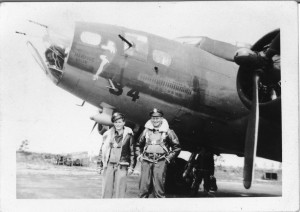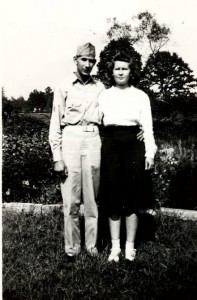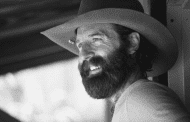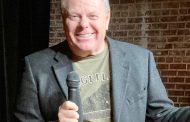By Sandra Bearden
Among the many veterans whose names are on the Trussville Veterans Memorial being dedicated next week in Civitan Park is that of James Kirksey (J.K.) Davis, who sought solace in small-town life after surviving 35 bombing missions as an Army Air Corps pilot in World War II.
Like many other Birmingham members of the Greatest Generation, Davis also helped his chosen community by employing leadership skills he’d developed as a young officer.
Many B-17 pilots didn’t return from the war, and those who did had some near misses. Davis was one of them.
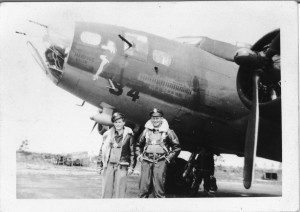
First Lt. James K. Davis (left), shown in this picture with a friend, Lt. Joe Amrhein, trained at McDill Field, Fla. on The Memphis Belle, a famous B-17 later memorialized in a movie. Later he piloted a similar B-17 in bombing missions over Germany.
submitted photo
On September 25, 1944, Davis was piloting his B-17, The Swing Shift Baby, over Ludwigshafen, Germany, when German anti-aircraft fire hit the plane, putting two engines out of commission. Davis proceeded with his mission, bombing the target before heading back to England with his crippled plane. He managed to leave German air space and ditch the aircraft in Luxembourg, maintaining control while his crew bailed out, then parachuting out himself.
“By a superb application of flying techniques, (Davis) managed to reach friendly territory…. The superior airmanship and unwavering devotion to duty by Lieutenant Davis on this occasion reflect highest credit upon himself and the Army Air Forces,” the official awards record states. Davis earned the Distinguished Flying Cross for his valor.
Strangely enough, son Bob Davis believes that his father never was sure that he actually received the honor. “Somehow, although he knew that the citation had been sent in for the medal, he never mentioned receiving it,” Davis said. Years later, the Davis family investigated and received paperwork and duplicate medals – the Flying Cross and a Purple Heart earned when he broke his foot while parachuting into a tree.
After he returned to Alabama, Davis met Dorothy Covington in a conventional setting (they lived in the same neighborhood), but with a pilot’s daring approach. He spotted her taking a Sunday stroll, stopped his car and introduced himself, then invited her out – to church. The couple was married in 1947. In 1948 the Davises bought and moved into a Cahaba Project home on West Mall.
Soon the Davis family became part of the postwar baby boom. Kirk, Bob, Pam and Carol soon arrived to take up residence in the Davises’ two-story house. Many men in the Project of that time were veterans, serving as coaches, Scout leaders and Sunday School teachers for young boys in the tightly knit neighborhood. J. K. led a group of Cub Scouts while his boys were in Scouting.
Davis had worked for Southern Bell Telephone company as a cable splicer before the war, and returned to the phone company, later supervising crews of PBX technicians. “He didn’t consider flying as a postwar career,” Bob said. “He once said he thought flying would be boring if you weren’t being shot at.”
He also was appointed to the Trussville Utilities Board. Many years later, after retiring from the phone company, he took a new job as general manager of Trussville Utilities on an “interim basis.” He stayed 18 years. During that time, Davis dealt with providing Trussville and other customers in the area with water and gas service in a period of unprecedented growth. Also during his tenure, Trussville Utilities bought the area which ultimately became the Trussville
Sports Complex for pumping stations, later giving all of that area to the city.
In 1993, the Trussville Area Chamber of Commerce presented Davis with its Gatekeeper Award for community service. Davis died in 1994. His wife Dot, Bob and his wife Leslie, and Bob’s sons Jamie and Paul still live on West Mall.
Bob Davis said that a trait that characterized his father throughout his life – from saving his crew as a 23-year-old bomber pilot to handling utility problems – was the ability to keep his cool in emergencies. “He didn’t look upon them as emergencies, but as challenges,” he added.



